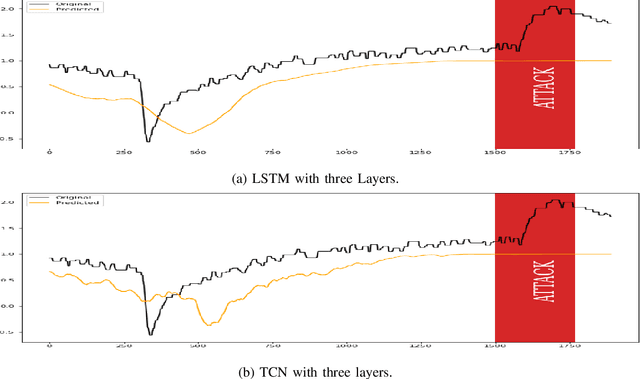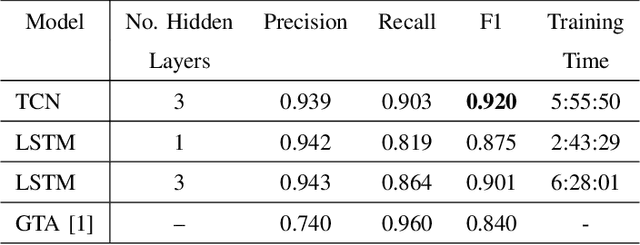Saroj Gopali
In-Context and Few-Shots Learning for Forecasting Time Series Data based on Large Language Models
Dec 08, 2025Abstract:Existing data-driven approaches in modeling and predicting time series data include ARIMA (Autoregressive Integrated Moving Average), Transformer-based models, LSTM (Long Short-Term Memory) and TCN (Temporal Convolutional Network). These approaches, and in particular deep learning-based models such as LSTM and TCN, have shown great results in predicting time series data. With the advancement of leveraging pre-trained foundation models such as Large Language Models (LLMs) and more notably Google's recent foundation model for time series data, {\it TimesFM} (Time Series Foundation Model), it is of interest to investigate whether these foundation models have the capability of outperforming existing modeling approaches in analyzing and predicting time series data. This paper investigates the performance of using LLM models for time series data prediction. We investigate the in-context learning methodology in the training of LLM models that are specific to the underlying application domain. More specifically, the paper explores training LLMs through in-context, zero-shot and few-shot learning and forecasting time series data with OpenAI {\tt o4-mini} and Gemini 2.5 Flash Lite, as well as the recent Google's Transformer-based TimesFM, a time series-specific foundation model, along with two deep learning models, namely TCN and LSTM networks. The findings indicate that TimesFM has the best overall performance with the lowest RMSE value (0.3023) and the competitive inference time (266 seconds). Furthermore, OpenAI's o4-mini also exhibits a good performance based on Zero Shot learning. These findings highlight pre-trained time series foundation models as a promising direction for real-time forecasting, enabling accurate and scalable deployment with minimal model adaptation.
The Performance of the LSTM-based Code Generated by Large Language Models (LLMs) in Forecasting Time Series Data
Nov 27, 2024



Abstract:As an intriguing case is the goodness of the machine and deep learning models generated by these LLMs in conducting automated scientific data analysis, where a data analyst may not have enough expertise in manually coding and optimizing complex deep learning models and codes and thus may opt to leverage LLMs to generate the required models. This paper investigates and compares the performance of the mainstream LLMs, such as ChatGPT, PaLM, LLama, and Falcon, in generating deep learning models for analyzing time series data, an important and popular data type with its prevalent applications in many application domains including financial and stock market. This research conducts a set of controlled experiments where the prompts for generating deep learning-based models are controlled with respect to sensitivity levels of four criteria including 1) Clarify and Specificity, 2) Objective and Intent, 3) Contextual Information, and 4) Format and Style. While the results are relatively mix, we observe some distinct patterns. We notice that using LLMs, we are able to generate deep learning-based models with executable codes for each dataset seperatly whose performance are comparable with the manually crafted and optimized LSTM models for predicting the whole time series dataset. We also noticed that ChatGPT outperforms the other LLMs in generating more accurate models. Furthermore, we observed that the goodness of the generated models vary with respect to the ``temperature'' parameter used in configuring LLMS. The results can be beneficial for data analysts and practitioners who would like to leverage generative AIs to produce good prediction models with acceptable goodness.
The Performance of Sequential Deep Learning Models in Detecting Phishing Websites Using Contextual Features of URLs
Apr 15, 2024Abstract:Cyber attacks continue to pose significant threats to individuals and organizations, stealing sensitive data such as personally identifiable information, financial information, and login credentials. Hence, detecting malicious websites before they cause any harm is critical to preventing fraud and monetary loss. To address the increasing number of phishing attacks, protective mechanisms must be highly responsive, adaptive, and scalable. Fortunately, advances in the field of machine learning, coupled with access to vast amounts of data, have led to the adoption of various deep learning models for timely detection of these cyber crimes. This study focuses on the detection of phishing websites using deep learning models such as Multi-Head Attention, Temporal Convolutional Network (TCN), BI-LSTM, and LSTM where URLs of the phishing websites are treated as a sequence. The results demonstrate that Multi-Head Attention and BI-LSTM model outperform some other deep learning-based algorithms such as TCN and LSTM in producing better precision, recall, and F1-scores.
A Survey on Blockchain-Based Federated Learning and Data Privacy
Jun 29, 2023
Abstract:Federated learning is a decentralized machine learning paradigm that allows multiple clients to collaborate by leveraging local computational power and the models transmission. This method reduces the costs and privacy concerns associated with centralized machine learning methods while ensuring data privacy by distributing training data across heterogeneous devices. On the other hand, federated learning has the drawback of data leakage due to the lack of privacy-preserving mechanisms employed during storage, transfer, and sharing, thus posing significant risks to data owners and suppliers. Blockchain technology has emerged as a promising technology for offering secure data-sharing platforms in federated learning, especially in Industrial Internet of Things (IIoT) settings. This survey aims to compare the performance and security of various data privacy mechanisms adopted in blockchain-based federated learning architectures. We conduct a systematic review of existing literature on secure data-sharing platforms for federated learning provided by blockchain technology, providing an in-depth overview of blockchain-based federated learning, its essential components, and discussing its principles, and potential applications. The primary contribution of this survey paper is to identify critical research questions and propose potential directions for future research in blockchain-based federated learning.
A Comparative Study of Detecting Anomalies in Time Series Data Using LSTM and TCN Models
Dec 17, 2021



Abstract:There exist several data-driven approaches that enable us model time series data including traditional regression-based modeling approaches (i.e., ARIMA). Recently, deep learning techniques have been introduced and explored in the context of time series analysis and prediction. A major research question to ask is the performance of these many variations of deep learning techniques in predicting time series data. This paper compares two prominent deep learning modeling techniques. The Recurrent Neural Network (RNN)-based Long Short-Term Memory (LSTM) and the convolutional Neural Network (CNN)-based Temporal Convolutional Networks (TCN) are compared and their performance and training time are reported. According to our experimental results, both modeling techniques perform comparably having TCN-based models outperform LSTM slightly. Moreover, the CNN-based TCN model builds a stable model faster than the RNN-based LSTM models.
 Add to Chrome
Add to Chrome Add to Firefox
Add to Firefox Add to Edge
Add to Edge